Former deputy prime minister Muhyiddin Yassin on August 9 officially registered Malaysia’s newest political party: Parti Pribumi Bersatu Malaysia, or Bersatu for short. The party is the latest salvo in a slow mutiny against Prime Minister Najib Razak that has centered for more than a year around a scandal involving state investment fund 1Malaysia Development Bhd (1MDB).
Although Malaysia’s opposition has long sought to dethrone the prime minister’s United Malays National Organization (UMNO), infighting and ethnic rivalries have kept it from posing a real challenge to the UMNO-led coalition that has governed Malaysia since independence in 1957. But in a sign of the test posed by this new party, former deputy prime minister Musa Hitam on August 10 predicted that the ruling coalition would call snap elections soon, before Bersatu has a chance to gain a foothold. It is still too early to tell whether Bersatu is capable of ousting UMNO, but the party could pose a challenge to the survival of Najib himself.
Bersatu president Muhyiddin is joined by former prime minister Mahathir Mohamad in the role of chairman, and Mahathir’s son, Mukhriz Mahathir, as vice president. All three are formerly key figures in UMNO who quit or were driven out over their criticism of the prime minister in the 1MDB scandal and his failure to adequately explain the hundreds of millions of dollars related to 1MDB that ended up in his personal bank accounts. The partnership of these former leaders—especially Mahathir, who led Malaysia for 22 years and shaped UMNO into its current form—presents Najib with a challenge he has not had to face from earlier opponents.
Malaysia’s most prominent opposition figure, Anwar Ibrahim, was labeled an UMNO traitor and faced character assassination years before Najib even took office. Najib continued putting pressure on Anwar after becoming prime minister, and after a close election in 2013, a court overturned Anwar’s prior acquittal on sodomy charges that were widely deemed political and sent Anwar back to prison.
Attacking the 91-year-old Mahathir’s reputation and painting him as a traitor in a similar manner would be difficult because of Mahathir’s long career as the face of UMNO. His decision to resign from the party in February followed solely from UMNO’s failure to address support for Najib’s role in the 1MDB debacle. Calling Mahathir a traitor would seem an act of desperation, and the charge would not likely stick even with UMNO devotees. The legitimacy that Mahathir brings to Bersatu could make it more appealing for potential UMNO defectors.
Bersatu could challenge UMNO’s place as the party of the bumiputera, or native Malays. Although the new party has already come under fire for its decision to allow only bumiputera to be fully fledged members (non-bumiputera are relegated to associate memberships), the move could give it some legitimacy in trying to replace UMNO. UMNO has long been cast as the “defender of the Malay” against other ethnicities in Malaysia. Najib has relied heavily on racial tensions to bolster support for UMNO, declaring that voters must defend UMNO at the ballot box so UMNO can defend bumiputera interests.
Taking on a similar role as defender of the bumiputera might allow Bersatu to chip away at Najib’s ability to utilize those tensions. An indication of Najib’s concern about this came in his quick accusations that Bersatu was “allied with DAP”—the largely secular and multiracial Democratic Action Party favored by Chinese Malaysians—and thus could not fight for the bumiputera.
To be sure, ousting Najib would take a monumental effort. The security of the premier is bolstered by weak institutions that are unable or unwilling to check the prime minister, and Mahathir himself is responsible for much of the undue power accorded to the office. Changes made during Mahathir's tenure in the 1980s restricted the political power of the sultans, the constitutional rulers of each state, and the courts. Recently implemented security legislation places many powers exclusively in the hands of the prime minister, giving him powerful tools to limit the ability of activists to openly protest against the government.
Najib’s strict control over political discourse extends to the media. One reason reaction to the 1MDB scandal has been relatively muted in Malaysia is because voters, particularly outside urban areas, are largely unaware of the scandal. News outlets that have pursued criticism of the prime minister—such as the now-defunct Malaysian Insider or the London-based Sarawak Report—have been blocked in Malaysia, and in the case of the former, forced to shut down. Journalists at government-controlled outlets have been banned from covering the story, making it significantly more difficult to sway voters and party members to desert the ruling party.
But the most important control Najib continues to exercise is through the patronage system. The executive’s control of the purse gives the prime minister the ability to reward loyalists and deprive critics of needed funds. UMNO representatives that depend on these funds know they risk their political survival by challenging Najib. Additionally, pork barrel spending allotted by the ruling coalition to the states helps secure the backing of voters who do not know how their regions would fare under a new government. It will be a tall order for Bersatu to compete against UMNO’s budget largesse.
For Bersatu to pose a significant challenge to the prime minister, much will depend on its ability to cooperate with the fragmented opposition. The election must be held before the end of August 2018, giving the opposition just two years to resolve squabbles over seat allocations, policy differences, and long-running conflicts between the former UMNO leaders and the parties they once disparaged. Although DAP leaders have already balked at such an alliance, other opposition party heads have shown a willingness to set aside those differences to oust the ruling coalition.
Even without those differences, however, the opposition faces an uphill battle trying to challenge Najib while assuring bumiputera voters and potential UMNO defectors that their interests will be as well-protected by a new opposition coalition as under the ruling coalition. The more UMNO loyalists Bersatu is able to win over, the easier this prospect will be. But after Najib’s purges of any outspoken critics in the party, it will be hard to sway many remaining diehards. The more Bersatu focuses on the image of “UMNO without Najib,” the easier it will be to lure away that support. More importantly, if 1MDB revelations from the ongoing investigations in the United States and other countries continue to drag Najib down, even UMNO loyalists may find that protecting the party means jettisoning the prime minister.






























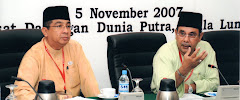


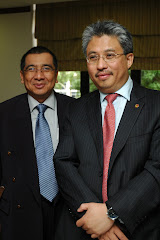
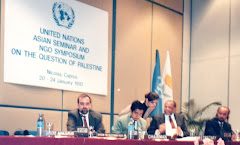
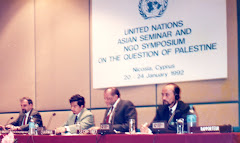

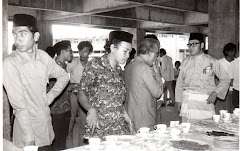
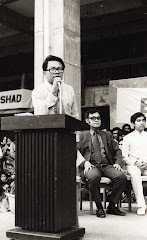


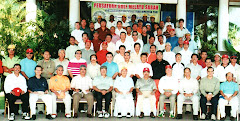





No comments:
Post a Comment